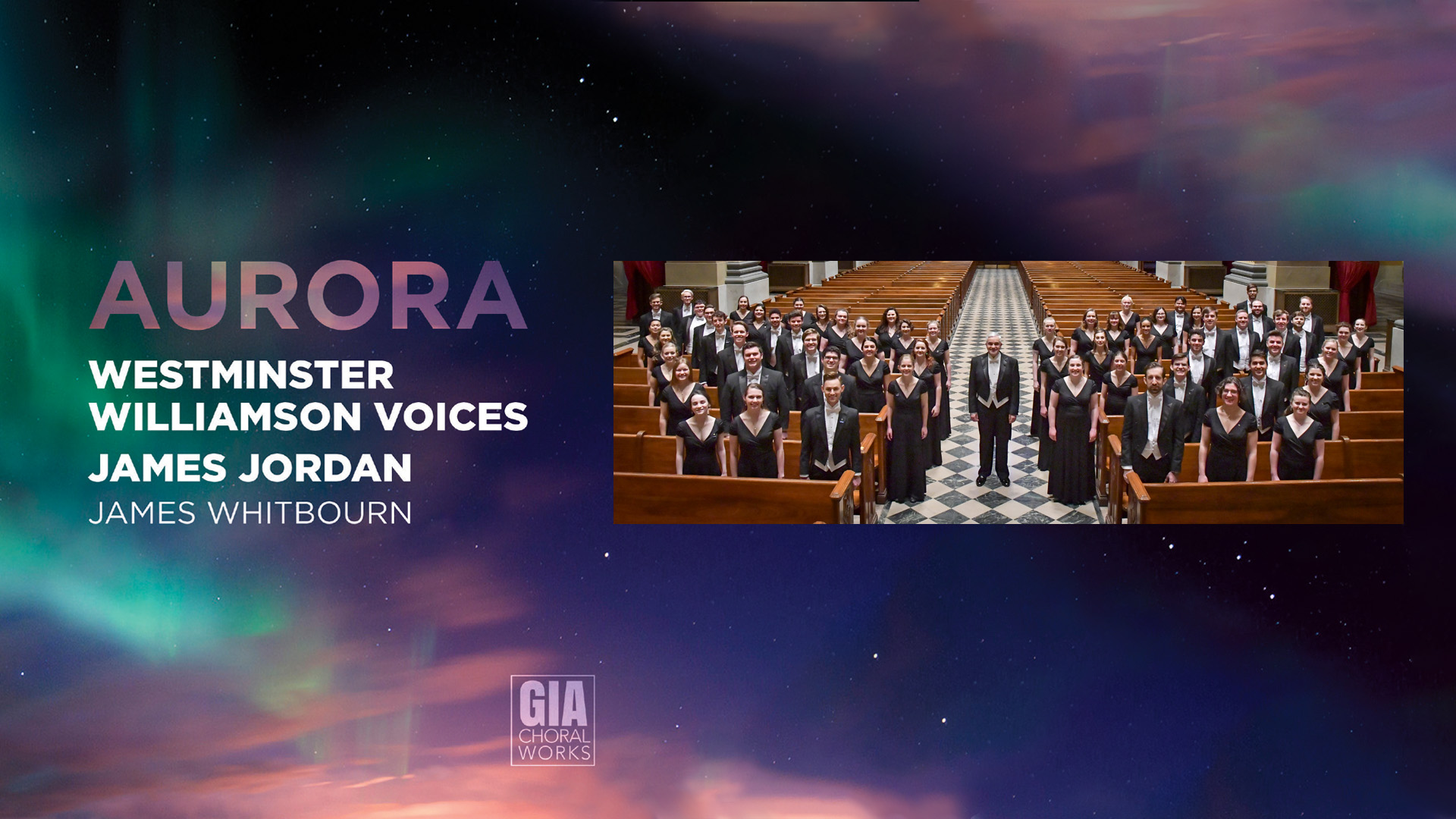Thursday, Jul 23, 2020
Aurora, the latest recording from the Westminster Williamson Voices and James Jordan, documents a three-year exploration of improvisation in various forms and more.
“The music on this CD pushes our boundaries of what could be considered “normal” music making and instead moves us into sound worlds that expand what a choral ensemble can produce,” says Jordan.
Chant and improvisation recur throughout the recording. Jordan reflects on his Interpolations on Palestrina’s Sicut cervus desiderat, an arrangement with soprano saxophonist Jeremy Powell: “What is the name of this music? It is simply what happens when a saxophonist and a choir meet together to make music. Just as jazz improvisation is a collaborative experience, so, too, was the birth of this piece. Although I was the arranger, there were many who contributed to this ‘new look’ at Palestrina.”
James Whitbourn’s Sanctitude takes the concept one step further by adding English and Arabic chant, performed by sopranos Isabella Burns and Krystel Dib, to an improvisation by the choir and the soprano saxophone. Writing about the recording session, Whitbourn, who also guest-conducted the track, says that he “provided the choir with an “aide memoir of the words of the hymn and a written description of the general scheme so the singers would know roughly what to expect next. This was the extent of the sheet music used. With the choir, we worked out our own bespoke set of hand signs so I could shape the performance as the piece unfolded. Everything else was decided on the spur of the moment. What we performed that day is presented here. It is what happened on that day.”
Aurora also includes compositions by Westminster alumnus Thomas LaVoy and current student Sam Scheibe. LaVoy’s works include The Last Letter, a setting of the last letter that Union soldier Sullivan Ballou wrote to his wife and is familiar to millions who watched Ken Burns’ PBS documentary The Civil War. The recording of LaVoy’s composition features Westminster students (now alumni) René Miville, baritone, and Véronique Shaftel, violin.
Sam Scheibe has written about his setting of the familiar Latin text O magnum mysterium, “The settings of these texts have an incredibly refreshing sense of inevitability, one that amplifies wonder in an already well-told story. This setting aims to highlight this notion through pitch. A great amount of mystery can be explored in the harmony, though all centered around a single pitch.
Aurora is available for purchase and streaming from all major audio outlets - including Amazon and Spotify
It's also available for purchase from GIA Music.
----------------------------------------------------------------------------------------------------------
Composed of students at Westminster Choir College of Rider University, the Westminster Williamson Voices is named for Westminster’s founder, John Finley Williamson. It is also the resident choir for the Choral Institute at Oxford in Oxford, England (rider.edu/oxford), one of the leading institutes in the world for the training of conductors that emphasizes artistry in performance. Recognized for its distinctive artistry, recordings, educational outreach and mission to perform new music, it is one of the few ensembles in the world that use chant as the center of their musicianship study and performance.
Reviewers on both sides of the Atlantic are of one voice in praising the Westminster Williamson Voices. Gramophone magazine has described the ensemble as one with “intimate and forceful choral artistry,” with a tone that is “controlled and silken in sustained phrases as they are vibrantly sonorous in extroverted material.” The American Record Guide praised the ensemble as “without peer.” The Choral Journal has described the Westminster Williamson Voices an ensemble of “supreme artistry” and a choir that performs with “truth and precision. Its recording of James Whitbourn’s Annelies, the first choral setting of the Diary of Anne Frank, was nominated for a 2013 Grammy Award for “Best Choral Performance.”
Grammy-nominated conductor James Jordan is recognized and praised throughout the musical world as one of America’s pre-eminent conductors, recording artists, writers, music psychologists and innovators in choral music. He was described as a “visionary” by The Choral Journal, which cited his book Evoking Sound as a “must read.” His 60 books explore both the philosophical and spiritual basis of musicianship, as well as aspects of choral rehearsal teaching and learning, and they are considered to be essential books in the conducting profession. At Westminster Choir College he is professor and senior conductor, and he conducts the critically acclaimed Westminster Williamson Voices. He is also director of the Westminster Conducting Institute and co-director of the Choral Institute at Oxford. (rider.edu/Oxford) Additionally, he is artistic director and conductor of the professional choral ensemble, The Same Stream.

